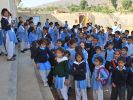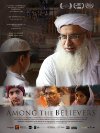Eye For Film >> Movies >> Among The Believers (2015) Film Review
Among The Believers
Reviewed by: Jennie Kermode

When the media use words like 'evil' and all the average Westerner hears about Islamic extremists relates to the harm they've done, how are people supposed to understand or anticipate what those extremists are thinking? Among The Believers, jointly directed by a Pakistani man and an Indian woman who lost a friend in the 2008 Mumbai hotel attacks, takes viewers inside Islamabad's primary Red Mosque madrasa, where radical cleric Maulana Aziz preaches war against the West and is willing to go into detail as to why.
Bertrand Russell once said that a man's choice between a bag of grain and democracy ultimately depends on how hungry he is. Something that hasn't been very visible in the West is the role that extremist factions in the Middle East have taken in supporting the poor. When we fist meet Aziz in this film, he's welcoming a boy of around six years old into the madrasa. The boy's mother was abandoned by her husband, he explains, and the two of them had nowhere else to go, so he gave them a home. The boy looks relieved and grateful. He shows his gratitude by reciting the verses from the Qur'an that he has been asked to learn, putting particular passion into lines about how invaders must be killed.

It's an uncomfortable moment - the first of many. More so because, though Aziz is certainly brainwashing such children - thousands at a time - his own background seems similarly compromised. He talks about seeing his father martyred in front of him; it later emerges that he has lost many relatives in such a way that questioning the cause could force him to confront an overwhelming weight of grief. Hanging round the madrasa, providing role models for the children, are mujahideen who are themselves products of the Red Mosque system. The result is something more disturbing than the popular notion of a group of people corrupted by one man, because there's nothing to suggest that this cycle would end, even if Aziz were taken out of the equation.
Aziz also discourses on history, accurately enough but including topics rarely touched on in the West. The filmmakers provide footage of Ronald Reagan schmoozing with the mujahideen to confirm what he says and help explain his motivation. But all this sounds a little too cosy, there's plenty to undercut it. We meet a girl who says she escaped after some time in the madrasa, where she was beaten, barely fed and taught nothing except how to recite the Qur'an (traditionally, madrasa education also provides some grounding in things like maths and science). We meet a father who admits he didn't think very much before choosing his boy's school, who is now worried by the way his boy talks about killing. Then there's the academic campaigning against the Red Mosques, who worries about terrorism and about the misleading impression of Islam that they are giving to the world.
All in all, Naqvi and Trivedi achieve a fine balancing act, giving no ground either to the fundamentalists or to the Islamophobes. Aziz's comments about corruption in politics and the judiciary emphasise the societal vulnerabilities that allow extremism to take root, and we see the poverty, especially in the villages, that encourages parents to take chances on anything that might allow their kids a way out. With much of the film shot between 2007 and 2009, the eventual conflict between the Red Mosques and the Pakistani government gets relatively little screen time, but this doesn't seem unreasonable given that the focus here is on the psychology behind the conflict. It's an effective Islamic extremism 101 but there's enough deeper substance here to make it intriguing as a human portrait, too.
Reviewed on: 02 Oct 2016
















